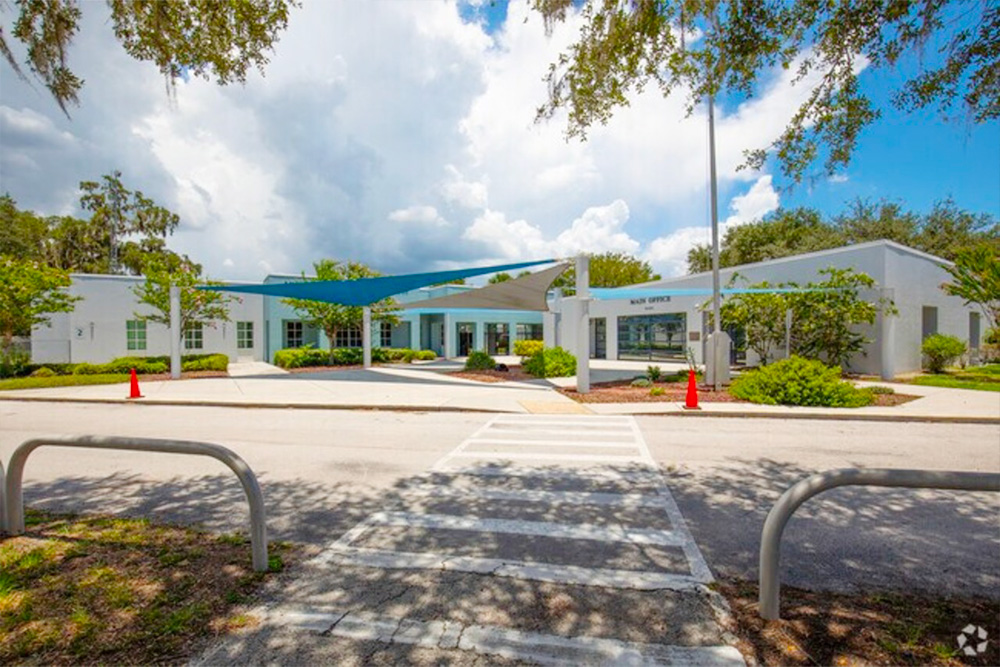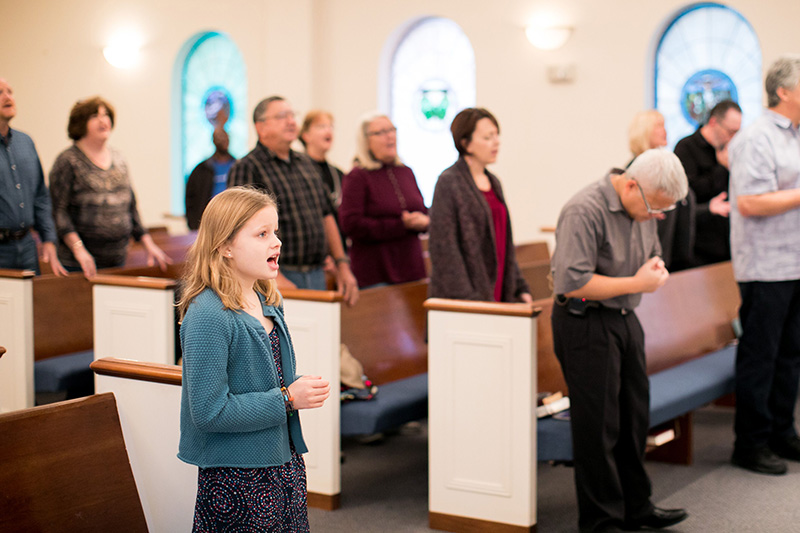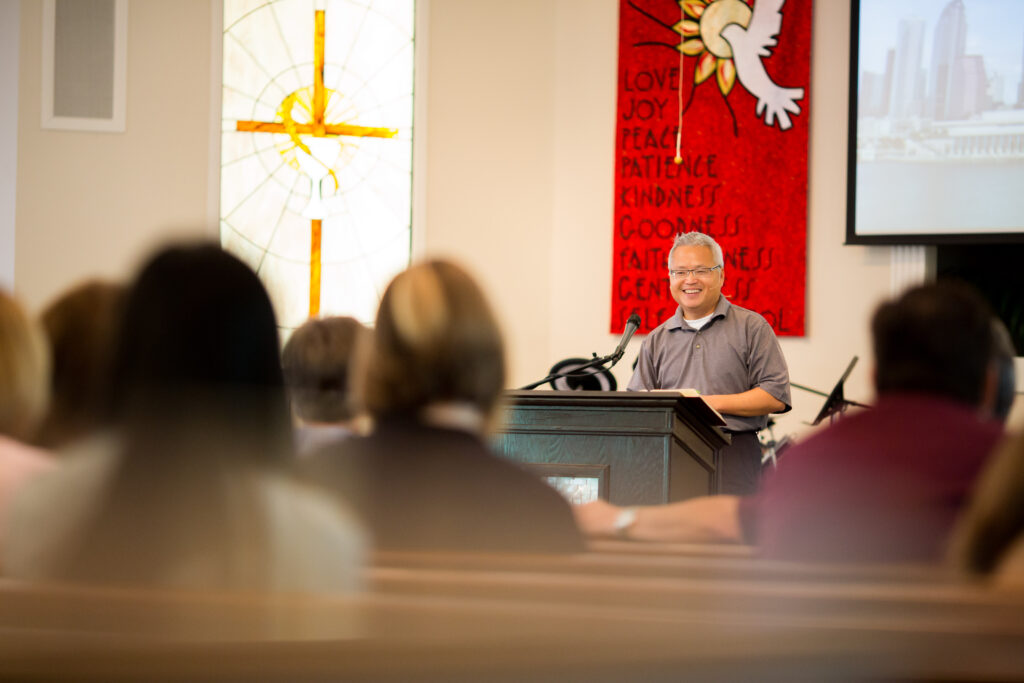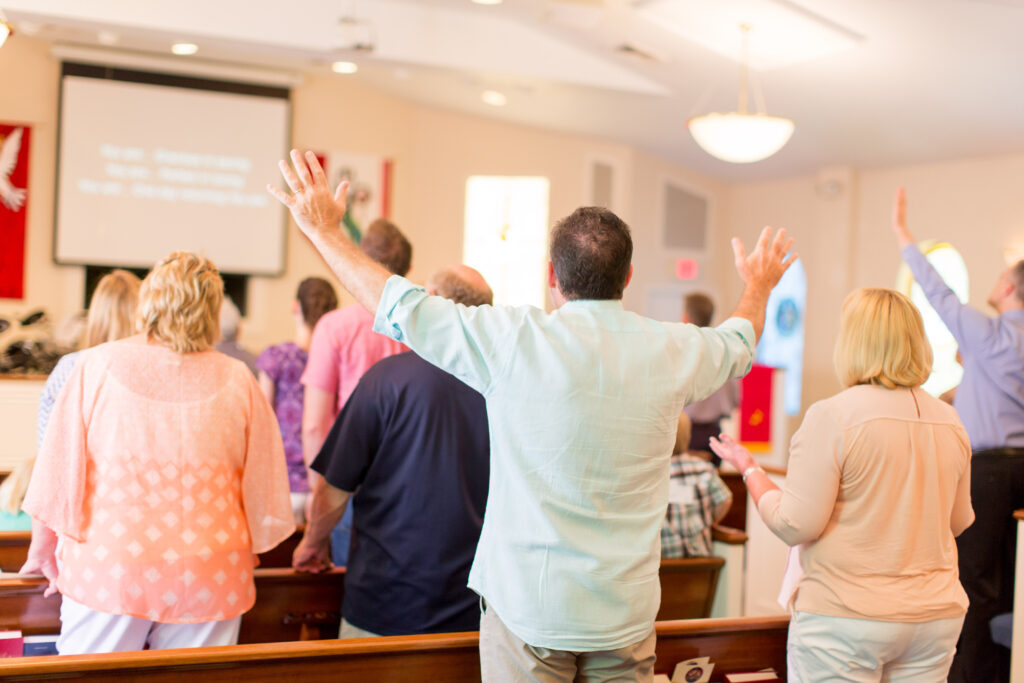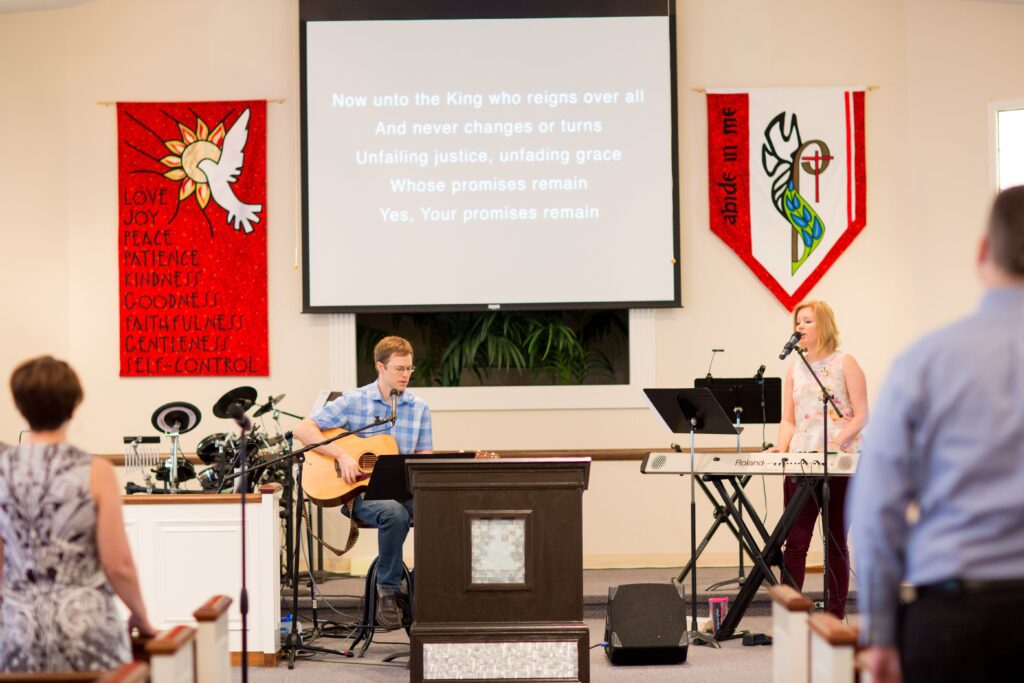We are moving to a NEW LOCATION!
Beginning Sunday, August 17 at 10:00 a.m., our new home will be:
Symmes Elementary School
6280 Watson Road
Riverview, FL 33569
Follow the signs and park on the side entrance. See you there!
WHO WE ARE
We are a local Gospel-centered, Bible-based community church located in the Riverview/Brandon, FL area, east of Tampa.
We are great sinners saved by a greater Savior. We are a multi-cultural group of individuals and families, glued together by the blood of Jesus Christ, and being transformed by His Gospel.
In 2016, we were sent out by our sister church in Saint Petersburg (www.gccc.net) to be a gospel witness in the Brandon/Riverview area. Our mission is summed up by this simple phrase, “Love the Gospel. Live the Gospel. Advance the Gospel.” As a church, we seek to grow continually in our knowledge and love for Jesus, to live in obedience to His teaching through the power of the Holy Spirit, and to proclaim His message to as many people as we can in our neighborhoods, and around the world.
WHAT WE BELIEVE
We believe God is the greatest treasure in heaven and on earth. This means there is nothing more worthy of our pursuit in life than to seek to know who he is, what he is like, and what he has done for us through Jesus Christ.
God has revealed himself to us in the Bible. Therefore, we believe the Bible is the only source we look to, with complete reliance on the Holy Spirit, to help us understand what we must believe about God, and how we must live in order to please him. All that we do as a church grows out of this conviction.

MISSION
We exist to build a faithful gospel witness in this generation and the next.
VALUES
The Gospel—God’s revelation of Himself in Jesus Christ—is at the center of our values.
Love the Gospel
Everything the church stands for grows out of the Gospel. This account of the redemption that was achieved by the life and work of Jesus Christ is focal point of all Scripture, and the reason for our hope. The Gospel must always be cherished and never neglected.
Live the Gospel
When the Gospel bears fruit in us, we are conformed to the image of the central character of the Story—Jesus Christ. Transformed by the power of the Savior, we will study the scriptures to grow in our knowledge of God, and allow that knowledge to shape every aspect of who we are, how we think, and what we do. That is what we mean by “living the Gospel.”
Advance the Gospel
The Gospel is the Story of how God the Redeemer seeks and saves the lost. As we are conformed to His image we will live to advance the Gospel: through prayer, by communicating the story to others, and through sacrificial living and giving in order to see the Gospel reach others.
STATEMENT OF FAITH
The Word of God
We believe that the Bible is the Word of God, fully inspired and without error in the original manuscripts, written under the inspiration of the Holy Spirit, and that it has supreme authority in all matters of faith and conduct (2 Timothy 3:16; 2 Peter 1:20, 21; Mark 13:31; John 8:31, 32; John 20:31; Acts 20:32).
The Triune God
We believe in one God, eternally existing in three equally divine persons: the Father, the Son, and the Holy Spirit, who know, love, and glorify one another. This one true and living God is perfect in His love and in His holiness. He is the Creator of all things, visible and invisible, and is therefore worthy to receive all glory and adoration. Immortal and eternal, He perfectly and exhaustively knows the end from the beginning, sustains and sovereignly rules over all things, and providentially brings about His eternal good purposes to redeem a people for Himself and restore His fallen creation to the praise of His glorious grace.
Revelation
God has graciously disclosed His existence, wisdom, and power in the created order and has supremely revealed Himself to fallen human beings in the person of His Son, the incarnate Word. Moreover, this God is a speaking God, who by His Spirit has graciously disclosed Himself in human words: we believe that God has inspired the words preserved in the Scriptures, the sixty-six books of the Old and New Testaments, which are both record and means of His saving work in the world. These writings alone constitute the verbally inspired Word of God, which is utterly authoritative and without error in the original writings, complete in its revelation of His will for salvation, sufficient for all that God requires us to believe and do, and final in its authority over every domain of knowledge to which it speaks. We confess that both our finitude and our sinfulness preclude the possibility of knowing God’s truth exhaustively, but we affirm that, enlightened by the Spirit of God, we can accurately know God’s revealed truth. The Bible is to be believed, as God’s instruction, in all that it teaches; obeyed, as God’s command, in all that it requires; and trusted, as God’s pledge, in all that it promises. As God’s people hear, believe, and practice the Word, they are equipped as disciples of Christ and witnesses to the Gospel.
Humanity
We believe that God created human beings, male and female, in His own image. Adam and Eve belonged to the created order that God Himself declared to be very good, serving as God’s agents to care for, manage, and govern creation, living in holy and devoted fellowship with their Maker. Men and women, both made in the image of God, equal in status and worth, with equal access to God by faith in Christ Jesus, are both called to move beyond passive self-indulgence to significant private and public engagement in family, church, and civic life.
Adam and Eve were made to complement each other in a one-flesh union that establishes the only normative pattern of sexual relations for men and women. Marriage is ordained by God as a covenantal union between one man and one woman, established at creation and affirmed by the Lord Jesus and His apostles. Sexual acts outside of marriage, including fornication, adultery, homosexuality, and any other sexually immoral practice, are sin (rebellion against God) and therefore unprofitable for man.
In God’s wise purposes, men and women are not simply interchangeable, but rather they complement each other in mutually enriching ways. God has assigned distinctive roles that reflect the loving relationship between Christ and the church, the husband exercising headship in a way that displays the caring, sacrificial love of Christ, and the wife submitting to her husband in a way that models the love of the church for her Lord. In the ministry of the church, both men and women are encouraged to serve Christ and to be developed to their full potential in the manifold ministries of the people of God. The restriction of certain leadership offices and roles within the church to qualified men is grounded in the creation, fall, and redemption and must not be sidelined by appeals to cultural variation.
The Fall
We believe that Adam, made in the image of God, distorted that image and forfeited his original blessedness—for himself and all his progeny—by falling into sin through Satan’s temptation. As a result, all human beings are alienated from God, corrupted in every aspect of their being (e.g., physically, mentally, volitionally, emotionally, spiritually) and condemned finally and irrevocably to death—apart from God’s own gracious intervention. The supreme need of all human beings is to be reconciled to the God under whose just and holy wrath we stand; the only hope of all human beings is the undeserved love of this same God, who alone can rescue us and restore us to Himself.
We believe that even fallen man retains a stamp of God’s image on his nature and therefore retains value that exceeds every other aspect of creation; that human life is always to be esteemed and protected from injustice. We believe that from the moment of conception, when life begins, a human life has a unique dignity and value until the day the soul returns to God who made it.
The Purpose of God in Redemption
We believe that from all eternity God determined in grace to save a great multitude of guilty sinners from every tribe, language, people, and nation and to this end foreknew them and chose them. We believe that God justifies and sanctifies those who by grace have faith in Jesus and that He will one day glorify them—all to the praise of His glorious grace. In love, God commands and implores all people to repent and believe, having set His saving love on those He has chosen and having ordained Christ to be their Redeemer.
The Redemption of Christ
We believe that, moved by love and in obedience to His Father, the eternal Son became human: the Word became flesh, fully God and fully human being, one Person in two natures. The man Jesus, the promised Messiah of Israel, was conceived through the miraculous agency of the Holy Spirit and was born of the virgin Mary. He perfectly obeyed His heavenly Father, lived a sinless life, performed miraculous signs, was crucified under Pontius Pilate, arose bodily from the dead on the third day, and ascended into heaven. As the mediatorial King, He is seated at the right hand of God the Father, exercising in heaven and on earth all of God’s sovereignty, and is our High Priest and righteous Advocate. We believe that by His incarnation, life, death, resurrection, and ascension, Jesus Christ acted as our representative and substitute. He did this so that in Him we might become the righteousness of God: on the cross He canceled sin, propitiated God, and, by bearing the full penalty of our sins, reconciled to God all those who believe. By His resurrection, Christ Jesus was vindicated by His Father, broke the power of death, defeated Satan, and brought everlasting life to all His people. By His ascension, He has been forever exalted as Lord and has prepared a place for us to be with Him. We believe that salvation is found in no one else, for there is no other name given under heaven by which we must be saved.
The Gospel
We believe that the Gospel is the good news of Jesus Christ—God’s very wisdom. Although it is utter folly to the world, the Gospel is the power of God to those who are being saved. This good news is Christological, centering on the cross and resurrection: the Gospel is not proclaimed if Christ is not proclaimed, and the authentic Christ has not been proclaimed if His death and resurrection are not central (the message is: “Christ died for our sins . . . [and] was raised” – 1 Corinthians 15:3-4). This good news is biblical (His death and resurrection are according to the Scriptures), theological and salvific (Christ died for our sins, to reconcile us to God – Ephesians 2:16), historical (if the saving events did not happen, our faith is worthless, we are still in our sins, and we are to be pitied more than all others – 1 Corinthians 15:14), apostolic (the message was entrusted to and transmitted by the apostles, who were witnesses of these saving events – Acts 1:21-22), intensely personal (where it is received, believed, and held firmly, individual persons are saved – Acts 2:28-39), and exclusive (“no one comes to the Father but by Me.” – John 14:6).
The Gospel is God’s announcement of the Kingdom of God (reign or rule of God) through Jesus Christ in the world. This reign was promised in the Old Testament and revealed in Christ’s birth, life, death, resurrection, and ascension. Christ’s crucifixion displays the glory of the Gospel, His resurrection demonstrates the power of the Gospel, and His ascension is the inauguration of Christ’s reign over all things in heaven and on earth through the Gospel. At the center of the Kingdom of God in Christ is the reconciliation of man to God and with one another. Moreover, it extends to everything in heaven and earth, consummated in the return of Jesus Christ.
Christ’s substitutionary and propitiatory sacrifice for our sins on the cross satisfies the demands of God’s holy justice and appeases His holy wrath. As our substitute, Christ died a vicarious, atoning, and propitiatory death on Calvary’s cross. In His substitution, Christ’s righteous life is also laid to our account (righteousness is credited to us), giving us more than a clean slate; He bestows on us a righteousness that is not our own.
At the cross, Christ was also our example. He suffered the most egregious injustice this fallen world can offer and in His temptation fully trusted God, showing us how faith overcomes suffering and injustice, even laying down His life for others. The Gospel declares both facets (the substitutionary or propitiatory and the exemplary) of Christ’s death on our behalf.
The cross also demonstrates His mysterious love and reveals His amazing grace. The cross is representative of the whole of the Gospel in many ways and is always to remain central in the Christian life. The Gospel reveals Jesus Christ as the only mediator between God and man.
Man’s Response to the Gospel
All who sin are slaves to sin, and only those Christ has set free are truly free. While still in his slavery to sin, man’s response to the Gospel is that no one seeks God and all turn away (Romans 3:9-18). Jesus Christ has authority to give eternal life to all whom the Father gives Him (John 17:2). As such, man’s response to the Gospel is rooted and grounded in the Father’s choice of us in Christ before the creation of the world to be holy and blameless in His sight. In love, He predestined us to be adopted as His sons through Jesus Christ, in accordance with His pleasure and will for the praise of His glorious grace, which He has freely given us in Jesus Christ (Ephesians 1:4-6). The message of the Gospel is only effectual to those who genuinely repent of their sins and by God’s grace put saving faith in Christ (Acts 2:38). This Gospel of grace is to be sincerely preached to all men in all nations, for God commands all men everywhere to repent. Biblical repentance is characterized by a changed life, and saving faith is trust in the work of Christ alone to save. Although neither repentance nor works saves, unless a person is willing to deny himself, pick up his cross, and follow Christ, he cannot become His disciple.
The Justification of Sinners
We believe that Christ, by His obedience and death, fully discharged the debt of all those who are justified. By His sacrifice, He bore in our stead the punishment due us for our sins, making a proper, real, and full satisfaction of God’s justice on our behalf. By His perfect obedience, He satisfied the just demands of God on our behalf, since that perfect obedience is credited to all who trust in Christ alone for their acceptance with God. Inasmuch as Christ was given by the Father for us, and His obedience and punishment were accepted in place of our own, freely and not because of anything meritorious in us, this justification is solely of free grace in order that both the exact justice and the rich grace of God might be glorified in the justification of sinners. We believe that a zeal for personal and public obedience flows from this free justification.
The Power of the Holy Spirit
We believe that salvation, attested in all Scripture and secured by Jesus Christ, is applied to His people by the Holy Spirit. Sent by the Father and the Son, the Holy Spirit glorifies the Lord Jesus Christ, and, as the “other” advocate (John 14:16), is present with and in believers. He convicts the world of its guilt in regard to sin, righteousness, and judgment and regenerates spiritually dead sinners by His powerful and mysterious work, awakening them to repentance and faith, and in Him they are baptized into union with the Lord Jesus. By the Spirit’s agency, believers are renewed, sanctified, and adopted into God’s family; they participate in the divine nature and receive His sovereignly distributed gifts. The Holy Spirit is Himself the down-payment of the promised inheritance and in this age indwells, guides, instructs, equips, revives, and empowers believers for Christ-like living and service.
Although all believers are baptized in one Spirit into one body at conversion (there is one baptism, not two separate events), the New Testament indicates the importance of an ongoing, empowering work of the Spirit subsequent to conversion as well. The Holy Spirit desires to fill each believer continually with power for Christian life and witness and imparts His supernatural gifts for the edification of the Church and for various works of ministry in the world. All the gifts of the Holy Spirit at work in the Church during the first century are available today, are vital for the mission of the Church, and are to be earnestly desired and practiced. We do not believe that certain gifts of the Spirit have ceased to operate in the Church today.
The Holy Spirit’s presence in the Church is what makes it a Christian community or fellowship. We are joined together in the fellowship of the Holy Spirit. It is the Spirit’s presence that characterizes the Church as an organism, a living entity, not an organization. We organize for the sake of mission, but we are a living community joined by God’s Spirit in Jesus Christ.
The Kingdom of God
We believe that those who have been saved by the grace of God through union with Christ by faith and through regeneration by the Holy Spirit enter the Kingdom of God (come under the reign of Jesus as King) and delight in the blessings of the new covenant: the forgiveness of sins, the inward transformation that awakens a desire to glorify, trust, and obey God, and the prospect of the glory yet to be revealed. Good works constitute indispensable evidence of saving grace. Living as salt in a world that is decaying and light in a world that is dark, believers should neither withdraw into seclusion from the world nor become indistinguishable from it. Rather, we are to do good to the city in which we live, for all the glory and honor of the nations is to be offered up to the living God. Recognizing whose created order this is, and because we are citizens of God’s Kingdom, we are to love our neighbors as ourselves, doing good to all, especially to those who belong to the household of God. The Kingdom of God, already present but not fully realized, is the exercise of God’s sovereignty in the world toward the eventual redemption of all creation. The Kingdom of God is an invasive power that plunders Satan’s dark kingdom, regenerating and renovating through repentance and faith the lives of individuals rescued from that kingdom. Therefore, the Kingdom of God inevitably establishes new communities of human life together under God.
God’s New People
We believe that God’s new covenant people (believers in Jesus) have already come to the heavenly Jerusalem (Hebrews 12:22); they are already seated with Christ in the heavenlies (Ephesians 2:6). This universal Church is manifest in local churches, of which Christ is the only Head. Thus, each local church is, in fact, the Church, the household of God, the assembly of the living God, and the pillar and foundation of the truth. The Church is the body of Christ, the apple of His eye, graven on His hands, and He has pledged Himself to her forever. The Church is distinguished by her Gospel message, her sacred ordinances, her discipline, her great mission, and, above all, by her love for God, and by her members’ love for one another and for the world. Crucially, this Gospel we cherish has both personal and corporate dimensions, neither of which may properly be overlooked. Christ Jesus is our peace: He has not only brought about peace with God, but also peace between alienated peoples. His purpose was to create in Himself one new humanity, thus making peace, and in one body to reconcile both Jew and Gentile to God through the cross, by which He put to death their hostility (Ephesians 2:11-22). This is the “new creation,” the Israel of God. The Church serves as a sign of God’s future new world when its members live for the service of one another and their neighbors, rather than for self-focus. The Church is the corporate dwelling place of God’s Spirit and the continuing witness of God to the world (Galatians 6:15-16).
Baptism and the Lord’s Supper
We believe that baptism and the Lord’s Supper are ordained by the Lord Jesus Himself. The former is connected with entrance into the new covenant community, the latter with ongoing covenant renewal. Together they are simultaneously God’s pledge to us, divinely ordained means of grace, our public vows of submission to the once crucified and now resurrected Christ, and anticipations of His return and of the consummation of all things.
Baptism, joined with faith and repentance, is a biblical part of the response man is to have to the Gospel. It is a means of expressing our commitment and union with Christ. Baptism is only intended for individuals who have received the saving benefits of Christ’s atoning work and are intent on being His disciple. Therefore, in obedience to Christ’s command and as a testimony to God, the church, oneself, and the world, a believer should be immersed in water in the name of the Father, Son, and Holy Spirit. Having been joined to Christ in His death through faith, water baptism is a visual demonstration of a person’s union with Christ in the likeness of His burial and resurrection. It signifies cleansing from his former sins, that his sinful way of life has been put to death and buried, and that he is raised to a whole new manner of life. It also vividly depicts a person’s release from the mastery of sin and participation in the new creation of God that began with the resurrection of Jesus Christ.
The Lord’s Supper is to be observed only by those who have become genuine followers of Christ. The elements of this meal symbolize the breaking of Christ’s body and the shedding of His blood on our behalf and is to be observed repeatedly throughout the Christian’s life as a sign of continued participation in the atoning benefits of Christ’s death and union to one another through sharing in this common meal. As we partake of the Lord’s Supper through faith, we remember and proclaim the death of Christ, receive spiritual nourishment for our souls, and should always consider how what Christ did for us should affect the way we live toward one another.
The Priesthood of All Believers
We believe that all believers have a direct relationship with God and are ultimately responsible to God in all matters of faith. Additionally, we believe that religious liberty ensures that each congregation has the right to order its own internal life, doctrine, and discipline in accordance with its understanding of divine truth. This requires the vigilance of each member of the body to ensure that this congregation not depart from the faith once and for all entrusted to the saints. The priesthood of all believers is not a belief that we are all isolated seekers of the truth (a single believer cannot be a priesthood), but that God has joined us together as a band of faithful followers of Jesus responsible to and for one another in seeking the truth that is in Jesus.
This also means that each local church is independent and must be free from interference by any ecclesiastical or political authority. Therefore, Church and State must be kept separate as having different functions, each fulfilling its duties free from dictation or patronage of the other. Although voluntary inter-church partnerships may be initiated by by the elders for specific areas of ministry, no external entity, be it state, denomination, or religious association, may intrude on or interfere with the internal governance and workings of this local congregation.
The Restoration of All Things
We believe in the personal, glorious, and bodily return of our Lord Jesus Christ with His holy angels, when He will exercise His role as final judge and His Kingdom will be consummated. We believe in the bodily resurrection of both the just and the unjust—the unjust to judgment and eternal, conscious punishment, as our Lord Himself taught, and the just to eternal blessedness in the presence of Him who sits on the throne and of the Lamb in the new heaven and the new earth, the home of righteousness. On that day the Church will be presented faultless before God by the obedience, suffering, and triumph of Christ, all sin purged and its wretched effects forever banished. God will be all in all and His people will be enthralled by the immediacy of His ineffable holiness, and everything will be to the praise of His glorious grace.
WHEN & WHERE WE MEET
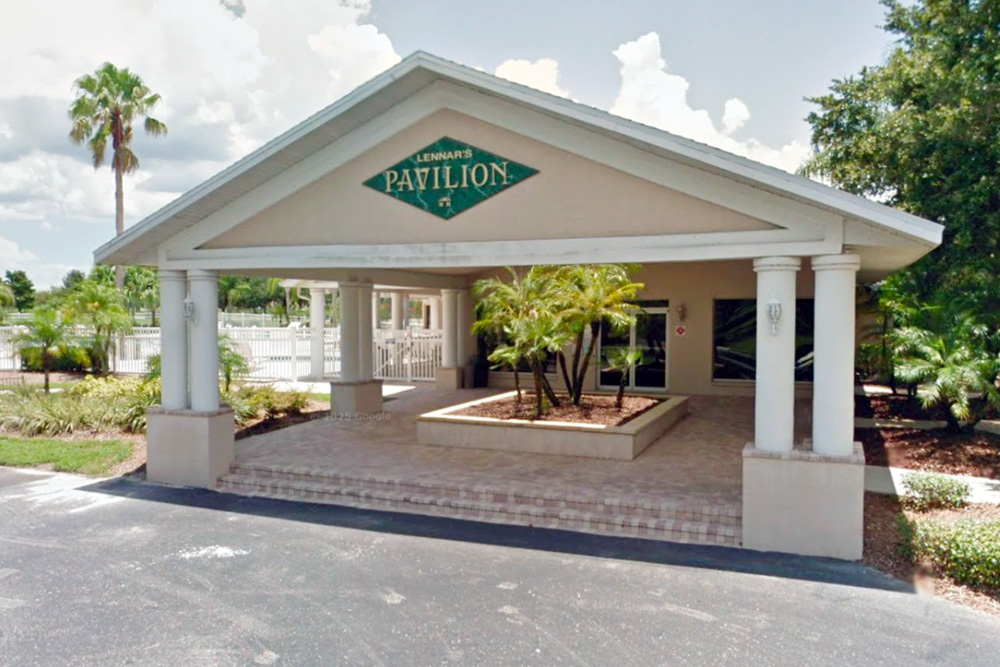
Worship Services: Sundays, 10:00 a.m. ET
CARE Groups: Locations and times vary
Pavilion Recreational Center Clubhouse
3330 Manor Cove Circle
Riverview, FL 33578





